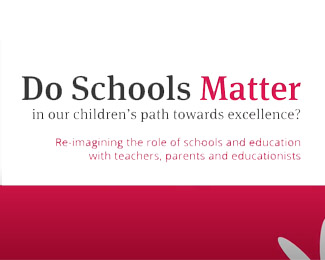Does School Matter?
Function of schools:
The functions of schools are to promote intellectual, aesthetic and moral development and support the transmission of culture. School’s core business is to design engaging work for students that calls on them to complete intellectually demanding tasks and leading them in successful completion of tasks.
Introduction:
Educators, parents, teachers, students, and others who comment on schools sometimes refer to the idea of schools as warehouse, factory, prison, or professional service delivery organisation. These metaphors signify the deeply ingrained assumptions and generalisations that influence how we understand schools. Are schools learning organisations? When asked this question, Peter Senge said, “Definitely not…Most teachers feel oppressed trying to conform to all kinds of rules, goals and objectives, many of which they don’t believe in. Teachers don’t work together; there’s very little sense of collective learning going on in most schools.” (The Fifth Discipline, p.3)
Critical perceptions about schools:
The tendency of some schools to simply store students away is commonly referred to by critics of schools. This signifies that some schools’ core work is labelling, categorising, containing and entertaining as warehouse. The idea of a school as prison and teachers as guards sometimes get conceived due to the perception that a coercive nature of relationship exist between students and teachers. Sometimes students are referred to as clients like hospitals and products like factory wherein teachers are considered a professional performer or skilled worker in a factory.
Superficial learning vs Profound learning:
There is no doubt that schools are focused on learning. But, due to the educational environment in the society, the focus of many is on a type of learning that can be produced in the form of compliance and not associated with profound learning – learning that calls on students to think and reason as well as to remember. It is superficial although it has the advantage of being easy to measure on standardised tests. Profound learning demands students to learn, relearn and the knowledge that they gain or develop be used in contexts beyond that in which it was learnt. Therefore, critical thinking is an essential element of profound knowledge learners. It challenges each student to pursue their subjects beyond classrooms. For this to happen the school culture must align with excellence of every student. With regard to students, Senge during a conversation on schools as learning organisations said: We say school is about learning, but by and large schooling has traditionally been about people memorising a lot of stuff that they don’t care too much about and the whole approach is quite fragmented. Really deep learning - profound learning - is a process that is inevitably driven by the learner, not someone else. And it always moves back and forth between a domain of thinking and domain of action. So having a student sit passively taking in information is hardly a very good model of learning: it is just what we‘re used to.
Challenges due to development in communication technology and consequent changes in social behaviour:
Apparently, the availability of digital learning platforms and opportunities, impact of peer groups and networking, and direct marketing to children such as free passes to concert or prize money in art, quiz competitions etcetera, present both challenges and opportunities to schools, parents, teachers and students. It has affected the relationship between and among parents, educators, and schools. In the future, students will have increasing choices which will determine the need of learning and its transmission between teachers and students. Students are comfortable with information. Anybody in the world with a computer and an internet connection has access to a wealth of information and knowledge. They can download and upload anything to the global pool of information. Therefore it is imperative for teachers to become expert pedagogue and focus on involving each student in critical thinking and pointing them to relevant sources which is very important as there is immense level of information overload rather than giving some more information.
All of these force us to think how we lead schools:
When learning can happen anywhere – outside the four walls of classrooms, open schooling systems, Massive Open Online Courses, internet, and through so many people rather than one teacher in the classroom – what is the need of schools? Does school matter? If at all we consider that schools are providing a well-rounded education, we must ensure that we are enabling our children to distinguish between right and wrong, knowledge and ignorance, music and noise, art and pornography, so that children may appreciate life and become humane and productive members of this ever more connected world.






